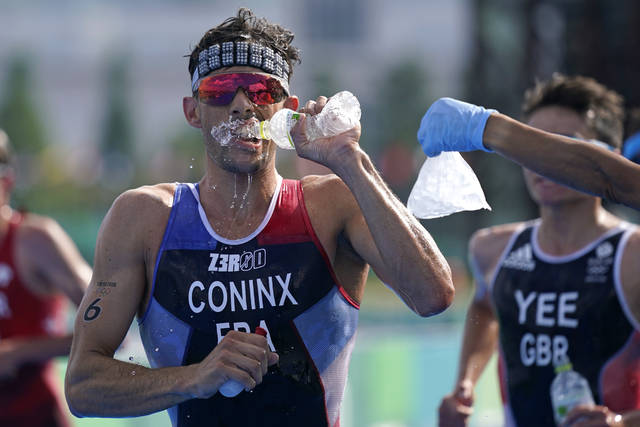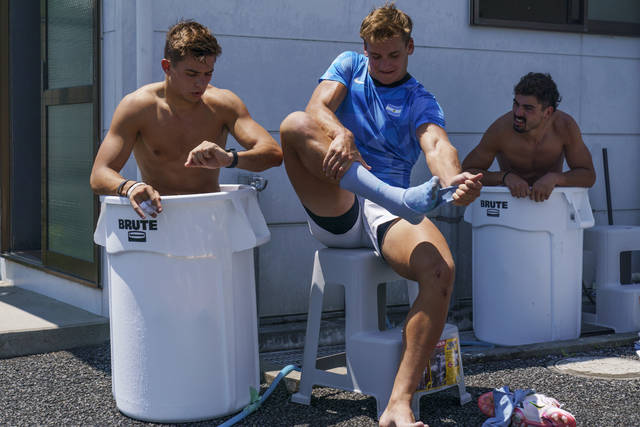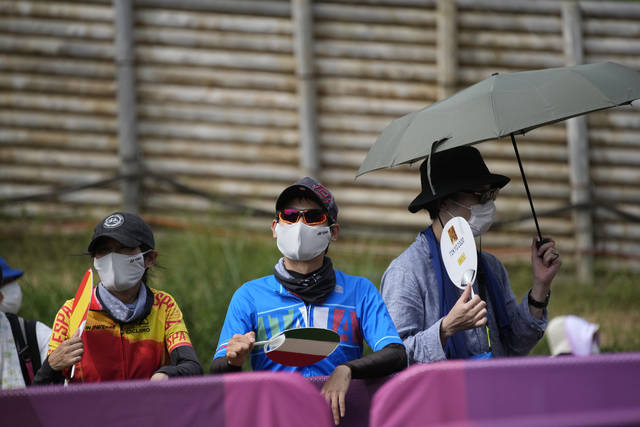


TOKYO (AP) — First, the sun. Now: the wind and the rain.
The Tokyo Olympics, delayed by the pandemic and opened under oppressive heat, are due for another hit of nature’s power: a typhoon arriving Tuesday morning that is forecast to disrupt at least some parts of the Games.
“Feels like we’re trying to prepare for bloody everything,” said New Zealand rugby sevens player Andrew Knewstubb.
Don’t worry, Japanese hosts say: In U.S. terms, the incoming weather is just a mid-grade tropical storm. And the surfers at Tsurigasaki beach say Tropical Storm Nepartak could actually improve the competition so long as it doesn’t hit the beach directly.
But archery, rowing and sailing have already adjusted their Tuesday schedules. Tokyo Games spokesman Masa Takaya said there were no other changes expected.
“It is a tropical storm of three grade out of five, so you shouldn’t be too much worried about that, but it is a typhoon in Japan interpretation,” Takaya said. “This is the weakest category, but this is still a typhoon so we should not be too optimistic about the impact of the course.”
The Japan Meteorological Agency said Nepartak was headed northwest over the Pacific Ocean east of Japan on Monday with landfall expected Tuesday afternoon. The storm could bring strong winds, up to 5.9 inches of rainfall and high waves as it cuts across Japan’s northeastern region.
In advance, organizers made the first major alterations to the Olympic archery schedule because of weather. There was an hour delay at the Beijing Games in 2008. Here, the Tuesday afternoon sessions have been postponed until Wednesday and Thursday.
“We’ve heard that storm could be anything from rain or 80-mph wind,” said American archer Jack Williams.
Beach volleyball plays in everything but lightning. Both the women’s final at the Beijing Games and men’s final at the Rio Games were held in heavy rain.
At Ariake Tennis Park, center court has a retractable roof that can be closed for inclement weather, but play on outer courts would have to be suspended.
Any sort of rain — typhoon, tropical storm, or even light sprinkling — will be a wild swing from the first three days of the Games.
Svetlana Gomboeva collapsed from heatstroke on the first day of archery but recovered to win a silver medal. Top-seeded Novak Djokovic and Medvedev, who who complained his first round match was “some of the worst” heat he’d ever played in, successfully leaned on the International Tennis Federation to give Olympics players extra time during breaks to offset the high temperatures.
Anastasia Pavlyuchenkova had resorted to shoving bags of ice up her skirt, and fiddled with a tube blowing cold air next to her seat. At skateboarding, the intense sun turned the park into a furnace, radiating off the light concrete with such blinding effect that skaters complained the heat was softening the rubber joints on their wheel axles and making the boards harder to control.
July and August in Japan are notoriously hot and humid. Japan has faced criticism for not accurately describing the severity and instead, during the bidding process, calling it mild and ideal.
On Tuesday
Gymnastics: Simone Biles had a rare off day — off for her — in qualifications and the Americans head into the women’s final trailing the team representing the Russian Olympic Committee.
The U.S. has three gymnasts making their Olympic debuts in Suni Lee, Grace McCallum and Jordan Chiles, and the trio all had significant form breaks as the Americans fell behind. But so did Biles, who despite putting up the top score was not at her best.
Biles bounded off the mat at the end of a tumbling pass on floor and her block on her Cheng vault was crooked.
Each member of the four-person team competed in each event during qualifications with the lowest score dropped.
For the finals, the competition moves to three-up/three-count and the Americans have thrived in that format for more than a decade. Biles is scheduled to compete in all five events with coverage live at 6:45 a.m. on Peacock with an encore during primetime on NBC.
Swimming: Katie Ledecky is seeking a second straight gold medal in the women’s 200-meter freestyle swim and then later that evening will attempt to win the Olympic debut of the women’s 1,500-meter freestyle.
Caeleb Dressel, who already has one gold medal in these Games, is expected to compete alongside Rio Olympic gold medalist Townley Haas and first-time Olympian Kieran Smith in the men’s 4×200 meter freestyle relay.
Zach Harting and Gunnar Bentz are both expected to contend for Team USA in the men’s 200-meter butterfly. Five races are up for medals during NBC’s primetime coverage, with the first final set to begin at 9:40 p.m.
Softball: The U.S. women’s softball team will play Japan for the gold medal in a rematch of the 2008 final, the previous time softball was an Olympic sport.
Japan won that game 3-1. The game will be live at 7 a.m. on NBC Sports Network with a replay in primetime.
Opening viewership
An estimated 17 million people in the United States watched the opening ceremony for the Tokyo Olympics held in a largely empty stadium, down 36% from the kickoff to the Rio de Janeiro Games five years ago.
The 17 million includes people who watched the ceremony live on NBC or online when it aired Friday morning and those who saw an edited version on NBC in prime time that night, the Nielsen company said Sunday.
NBC was unable to break down how many people watched live and how many saw the prime-time version. The 26.7 million who saw the Rio opening ceremony included both television and online viewership.
Nine years ago, when the Summer Olympics were held in London, the opening ceremony drew a record-setting U.S. audience of 40.7 million people.




